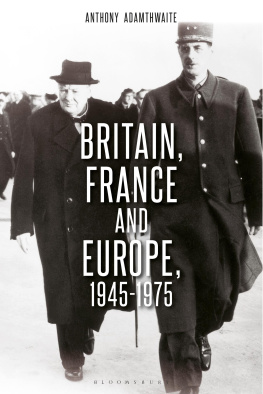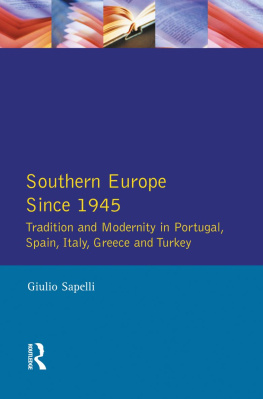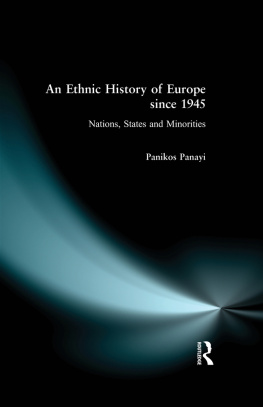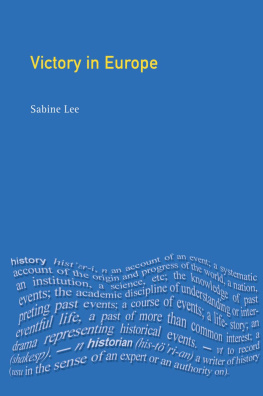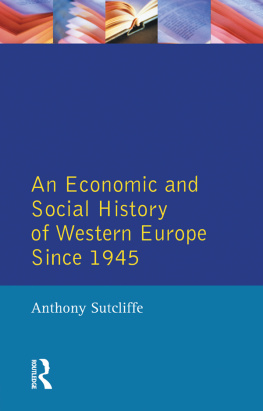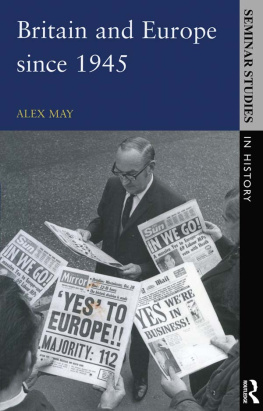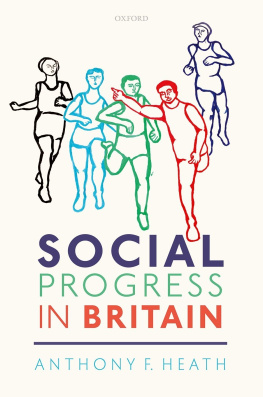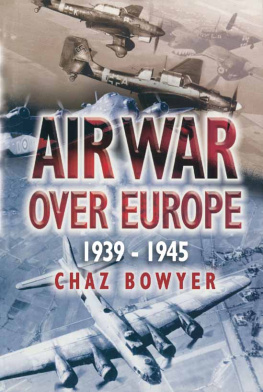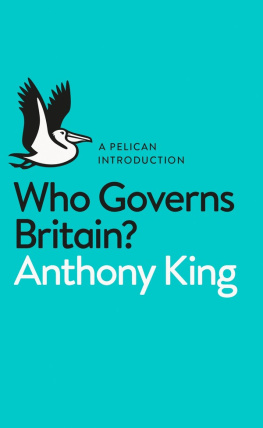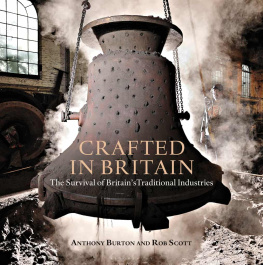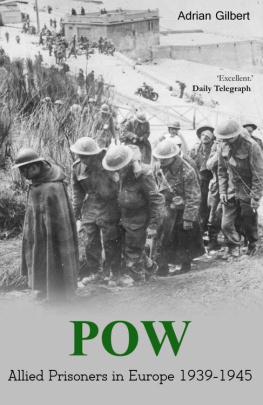Anthony Adamthwaite - Britain, France and Europe, 1945–1975: The Elusive Alliance
Here you can read online Anthony Adamthwaite - Britain, France and Europe, 1945–1975: The Elusive Alliance full text of the book (entire story) in english for free. Download pdf and epub, get meaning, cover and reviews about this ebook. year: 2020, publisher: Bloomsbury Publishing, genre: Politics. Description of the work, (preface) as well as reviews are available. Best literature library LitArk.com created for fans of good reading and offers a wide selection of genres:
Romance novel
Science fiction
Adventure
Detective
Science
History
Home and family
Prose
Art
Politics
Computer
Non-fiction
Religion
Business
Children
Humor
Choose a favorite category and find really read worthwhile books. Enjoy immersion in the world of imagination, feel the emotions of the characters or learn something new for yourself, make an fascinating discovery.
- Book:Britain, France and Europe, 1945–1975: The Elusive Alliance
- Author:
- Publisher:Bloomsbury Publishing
- Genre:
- Year:2020
- Rating:5 / 5
- Favourites:Add to favourites
- Your mark:
- 100
- 1
- 2
- 3
- 4
- 5
Britain, France and Europe, 1945–1975: The Elusive Alliance: summary, description and annotation
We offer to read an annotation, description, summary or preface (depends on what the author of the book "Britain, France and Europe, 1945–1975: The Elusive Alliance" wrote himself). If you haven't found the necessary information about the book — write in the comments, we will try to find it.
Britain, France and Europe, 1945–1975: The Elusive Alliance — read online for free the complete book (whole text) full work
Below is the text of the book, divided by pages. System saving the place of the last page read, allows you to conveniently read the book "Britain, France and Europe, 1945–1975: The Elusive Alliance" online for free, without having to search again every time where you left off. Put a bookmark, and you can go to the page where you finished reading at any time.
Font size:
Interval:
Bookmark:

The impetus for writing originated in a study of the origins of the Second World War. Hitlers empire building in the 1930s thrived on AngloFrench disarray. After 1919 Britain and France shared, and disputed and lost control of Europe. After holding up in the First World War the Entente Cordiale looked the worse for wear by the 1920s. A timely makeover could have prevented the war of 1939. The second conflict reconfigured global politics and opened a nuclear age, enthroning the new behemoths, the United States and the Soviet Union. For over four decades.Moscow and Washington determined the high politics of Europe. Almost forgotten now are the initiatives to reinvent the Entente as a hinge for a FrancoBritish Europe. The defeat of Germany and its allies left Britain and France the natural leaders of Western Europe. Alliance with France, trumpeted Churchill, was a fundamental principle of British policy. French ministers pushed for bilateral economic planning; foreign secretary Ernest Bevin extolled joint exploitation of African empires to ensure independence from the United States. The rhetoric delivered a mouse the Dunkirk Treaty of March 1947, a skeletal fifty-year defence pact.
I advance a three-pronged argument. First, partnership offered a second career for redundant imperial powers. Yes, the two neighbours were an odd couple but not so odd as to rule out alliance. Obstacles were surmountable FrancoGerman and AngloAmerican collaboration overcame substantial hurdles. The synergy of teaming up could have fast tracked London and Paris, making the continents voice heard in Cold War conclaves and nurturing a different kind of European community. Churchill offered France union in 1940 and the idea stayed in the French playbook prime minister Guy Mollet resurrected it in 1956. Mores the pity. The 1960s offered a second bite of the cherry, a window to reposition Western Europe in world politics that would not reopen until the 1990s. As nuclear states and UN Security Council members, Britain and France in tandem might have accomplished what neither could achieve alone a more independent Europe, partner rather than client of the United States, with the potential to broker EastWest dtente.
Second, UK movers and shakers spurned the pooling of resources, alleging conflicting national characters and interests, the priority of an AngloAmerican alliance, Frances economic and political weakness, and its large Communist party. The pair went their own ways. Surprisingly, despite defeat, occupation and bitter colonial wars, France repackaged itself quickly and successfully. I ask why. Political cultures made a difference. A leaner, casual French style, juiced by modernization and a sense of universal mission, triumphed over a buttoned-up, rule-bound British mode. The architect of modernization, wild card Jean Monnet, epitomized the contrasting approaches. In 1949 he hosted British mandarins at his country house in a bid to promote a FrancoBritish Europe based on integrated national economic plans.
Third, I argue that
Mainstream narratives have misunderestimated to use a Bushism the prospects for FrancoBritish leadership in Europe. Historians, like international travellers, sometimes miss key developments. Changing trains in the Latvian capital Riga in the 1930s, novelist Graham Greene missed a revolution. The foundation myth of the European Union as a triumph of light and reason squeezed out other scenarios. Cross-channel initiatives left few prints. AmericanSoviet management of Europes high politics, coupled with the rise of the legendary special relationship, eclipsed earlier dreams of a LondonParis duopoly. Last, but not least, different visions of Europe competed. As late as 1948 French leaders envisioned a neutral third force continent brokering peace terms between the titans; Bevin too talked of a third force in alliance with the United States. Economic integration supplied another bone of contention. Britains cautious inter-governmental approach vied with continental sympathy for a supranational solution. The Attlee government rejected Frances path-breaking Schuman Plan for a European coal and steel authority, partly because it distrusted France, and partly to protect the AngloAmerican alliance, but chiefly to promote UK leadership.
A French historian downplayed the ententes dark side. Since 1815, apart from a few clashes between the British and the forces of the Vichy government, wrote Franois Crouzet, the sound of battle has died away, leaving a true symbiosis between England and France.
What were the The survival of the furniture of rank armies, empire, moral prestige and a seat at the top table with the superpowers concealed the price of victory. In 1946 London could still summon Abdullah, ruler of Transjordan, and tell him his country was to be independent and he was to be king.
Historians have lambasted the Attlee government for clinging to grandeur at the expense of the economy and welfare state. The critique is overly simplistic. Downsizing overseas commitments was not practical politics in 1945. Peoples looked forward to the fruits of victory. Like Martin Luther they could do no other. The dream of reclaiming power and glory sustained French morale under German occupation, and fuelled the post1945 eight-year IndoChina war. Downsizing would have seemed a betrayal of wartime sacrifice. Labour prime minister Clement Attlee broached disengagement from the Middle East, but accepted great power identity. Indian independence in 1947 was considered a one-time fulfilment of wartime promises, leaving empire a going concern.
Power, like Hamlets fathers ghost, quickly dissolved tis here, tis gone. The superpowers occupied centre stage. There is no solution to our problems over which we ourselves exercise much freedom of choice, confessed one of Attlees ministers. Insistence on great power privilege, McCourt argues, succeeded because it met the expectations of significant others: the United States, major allies, international and domestic constituencies. As Americas prefects, London and Paris wielded influence over and above their intrinsic power.
Double harness would have given Britain and France street cred in American and Russian eyes.
A new global architecture founded on the Atlantic Charter of 1941 offered traction in a reconfigured world. European regional institutions followed: Brussels Treaty Organization, OEEC, Council of Europe and ECSC. The multilateralism of the revamped international order fostered an interdependence unrealized before 1939. Fledgling institutions forged a collaborative culture, hardwiring habits of cooperation. Yet FrancoBritish collaboration stalled. Obsolete great power ambitions echoed a Victorian narrative of greatness. The geopolitical revolution demanded a new plot a reimagining of the nation state. Instead, a narrow focus on regaining rank turned cooperation into a quick fix to speed national recovery.
Over sanguine perceptions of UK economic strength and global ranking put the damper on joint enterprise. In 19456 economic and geopolitical fallout appeared reversible, making joint planning seem unnecessary. The realization, however, of the irreversibility of change supplied arguments against partnership in a Cold War climate. A much weaker ally with a large Communist party might turn into a millstone. Going it alone seemed to work best. In The Future of Socialism (1956) Labour Party intellectual Tony Crosland enthused over Britains pole position in Western Europe, and descried sunny Socialist uplands. In the same year the country scored a first with the opening of Calder Hall, the worlds first commercial nuclear power station. Blue Streak, a medium-range ballistic missile, was slated to replace an ageing V-bomber nuclear strike force. A superior British way promised high dividends.
Next pageFont size:
Interval:
Bookmark:
Similar books «Britain, France and Europe, 1945–1975: The Elusive Alliance»
Look at similar books to Britain, France and Europe, 1945–1975: The Elusive Alliance. We have selected literature similar in name and meaning in the hope of providing readers with more options to find new, interesting, not yet read works.
Discussion, reviews of the book Britain, France and Europe, 1945–1975: The Elusive Alliance and just readers' own opinions. Leave your comments, write what you think about the work, its meaning or the main characters. Specify what exactly you liked and what you didn't like, and why you think so.

